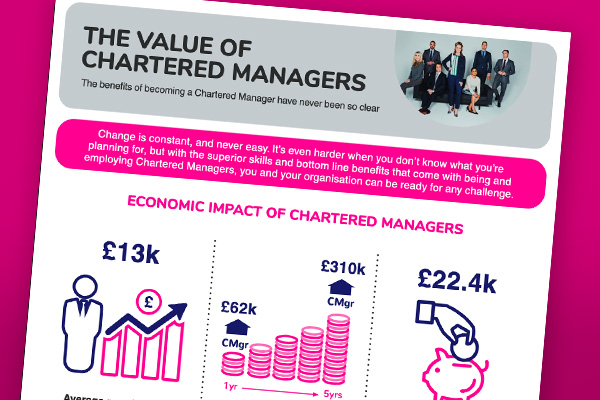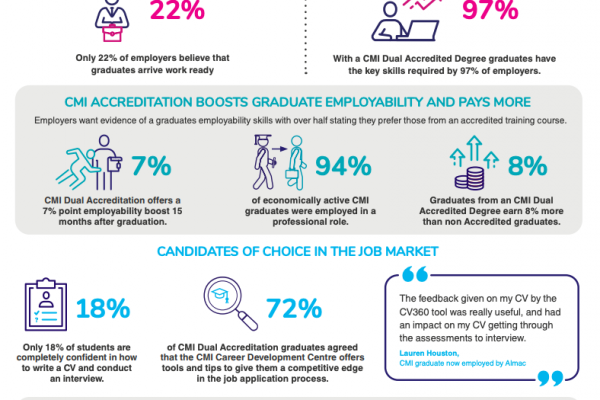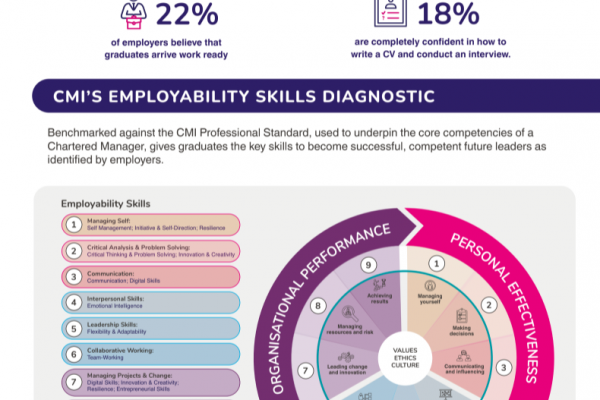Helping today’s managers to be heard
CMI’s Managers Voice represents the voice of managers across the nation.
Managers Voice is an exclusive Community of CMI managers representing the voice of UK management. The Community offers an opportunity to share thoughts through weekly polls, surveys and conversations on critical management issues.
By speaking directly to our online Community of managers and leaders, their opinions and feedback shape the support that CMI delivers to its members. Critically this ensures the voice and needs of professionally qualified managers are heard at a National level by Government, business leaders and key stakeholders.
On this page, you’ll find the latest findings from our Managers Voice surveys and polls, straight from our Managers Voice online Community. Along with quick links to our past research findings.
If you’d like to register your interest to become part of the Managers Voice Community, please fill in the form below.

Our Latest Research
April 2022
Is hybrid working considered a benefit?
- The majority of managers agreed that hybrid working has benefited them. It has:
- made it easier for them to balance work and home life commitments (84%), and has allowed them to work contracted hours flexibly around home life commitments (81%).
- opened up job opportunities where it would have been difficult to balance work and home life commitments if these roles had been office based (60%).
- Female managers are significantly more likely than male managers to strongly agree that hybrid working has opened up job opportunities where it would have been difficult to balance work and home life commitments if these roles had been office based (31% vs. 22%).
Being overlooked for workplace opportunities because of your identity
- Nearly half of managers (47%) felt they have been overlooked for at least one opportunity because of their identity, most notably the following three opportunities. Our research highlighted that women with children were more likely to feel they had missed out than male managers with children and male managers generally.
- promotions (31%):
- female managers with children, compared to male managers with children (37% vs. 27%)
- salary rises (29%)
- female managers with children, compared to male managers with children (33% vs. 20%)
- stretch projects (24%)
- female managers with children, compared to male managers with children (30% vs. 19%)
- promotions (31%):
March 2022
Pay awards and salary increases
- 52% of all managers said that their organisation would offer a basic pay award this year.
- 79% of these said their organisation typically offered a basic pay award in a regular year - meaning that 1 in 10 (9%) didn't plan to offer in 2022.
- On average, the cost of living increase in 2022 to date is c.5.9%. Where basic pay rises were awarded, managers reported this was on average 2.8%.
- Typically managers earn £46,450 so this basic pay award means an additional £1,300.
- If the basic pay award was in line with the increase in the cost of living the increase would be £2,740.
- Nearly half (45%) of managers said their direct reports had not requested a pay rise, beyond a basic pay award:
- 39% of managers with direct reports said they had noticed an increase in the the number of direct reports requesting pay rises, beyond a basic pay award
- A significant proportion of managers (36%) reported they themselves would need to ask for a pay rise beyond a basic pay award to meet the rising cost of living:
Business continuity planning
- Three quarters of managers (74%) reported a business continuity plan in place in their organisation in March 2022
- Of those who said their organisation had no business continuity plan in place in March 2022, nearly half of managers (46%) said their organisation was not planning to implement one, and 42% did not know.
Supply chains
- Over half of managers (58%) said their organisation’s supply chains had faced disruptions since April 2021, but less than half (44%) of all managers said their organisation had undertaken a review to assess the security of the supply chain.
Financial stability
- The majority of private sector managers (56%) reported they were not concerned about the financial strength of their organisation, although just over a third (34%) were concerned.
- However the majority of managers disagreed that the Spring Statement went far enough to help their organisation (81%) and UK businesses generally (83%) with increasing costs.
- Nearly half of managers (47%) said they did not know if their organisation was planning to take any action to protect the business from the impact of rising costs, but over 2 in 5 (43%) said actions would be taken.
- Most commonly, managers who reported their business had taken action to protect against rising costs reported that their organisations either had done or were planning to:
- Re-negotiate contracts with suppliers (64%)
- Reduce departmental budgets (55%)
- Reducing capital expenditure (49%).
- Considering business processes and investment, over half of managers said their organisation would be looking to do more in 2022 to reduce carbon emissions (53%) and review the organisation’s processes to identify efficiencies (52%) compared to 2021.
Staff impacts and support packages
- The majority of managers disagreed (76%) that the Spring Statement was sufficient to support British employees through the costs of living increases experienced in March 2022.
- The majority of managers (88%) with direct reports said their team was concerned about the costs of living.
- The majority of managers perceived their role as important in supporting staff with financial wellbeing (67%) and promoting financial wellbeing support to staff (70%).
- Despite this half of managers (56%) said their organisation was not planning to take any action to support staff as a direct result of the cost living crisis in March 2022 - only a fifth (19%) said action would be taken. Of those who reported action would be taken, the most commonly mentioned were:
- promoting employee assistance programme more extensively (48%)
- promoting home/hybrid working to reduce commuting costs (44%)
February 2022
Hybrid working
Adoption
- Hybrid working has been adopted across UK workforces as a result of Covid: 84% of managers say their organisation adopts a hybrid working approach.
- 66% say their organisation began working this way since Covid-19.
- Hybrid working policies are generally in place:
- 66% of managers in organisations who work in a hybrid fashion say a hybrid working policy is in place.
- 45% say the policy sits within an overarching flexible working policy.
Days required in the office with a hybrid policy
- Policies are on the whole not prescriptive on workplace days: 59% of managers in organisations with a policy in place, say the policy does not specify the number of days employees must work from the workplace.
Training
- Approaching two in three (63%) managers with direct reports working remotely have have never received training on how to manage someone who is working remotely
- One in three (32%) managers received training on how to manage someone working remotely.
- 10% say they received this training before the pandemic.
- 22% say they received this training during the pandemic.
Favourability
- Across the board managers and employees are in favour of maintain hybrid working:
- 89% of managers are personally in favour of hybrid working.
- 85% of managers say that employees in their organisation are also in favour of hybrid working.
Handling difficult conversations
- Seven in ten (71%) managers working remotely in some form claim to have personally conducted a difficult conversation over a video call.
- Amongst these, 11% managers have conducted dismissal procedures and/or dismissed staff
- More than one in four (28%) managers are aware of someone in their organisation who has had to undertake dismissal procedures and/or dismissed staff over a video call in the last 2 years.
- Overall, 29% of managers have either personally dismissed someone via video call or are aware of a colleague having done so.
Dismissing staff via video call
- Overall, three in four (76%) managers personally think that dismissing staff for underperformance via a video call is not the right approach for a business to take.
Team management
- Hybrid working as a direct result of Covid has made some elements of a manager's role harder.
- More than half say hybrid working has made their role as a manager onboarding new starters (69%) and building relationships (54%) harder
- There is a split of opinion about whether it is harder for a manager to manage their team
- 43% of managers say hybrid working has made it harder to manage their team, but 40% of managers say it has made no difference to their ability to manage their team.
- At least two in five say hybrid working has made no difference to the following aspects of managing their team:
- managing disciplinary procedures (53%)
- managing performance (53%)
- managing conflict (45%)
Productivity
- The majority of managers who report a move to hybrid working as a result of the pandemic, suggest that productivity has increased.
- 54% of managers agree they have seen an increase in productivity in their direct reports following the pandemic.
- Although nearly 1 in 5 (17%) who moved to hybrid working as a result of the pandemic disagree that productivity has increased.
- 27% do not think that the pandemic has had an impact on productivity: they neither agree nor disagree that productivity has increased.
Managing upwards
- Nearly half (48%) of managers think that the pandemic has made no difference to their ability to ‘manage upwards’ with their line managers.
- However more than a quarter (28%) of managers say hybrid working has made managing upwards harder.
Covid-19 broke the workplace mould, here's how to fix it. We have used our research findings to bring together our Better Managers Manual.
Key CMI Research

Get involved
Our Managers Voice online Community is exclusively for CMI members. Register your interest to join our Managers Voice online Community or find out more about the benefits of becoming a CMI member, below.





